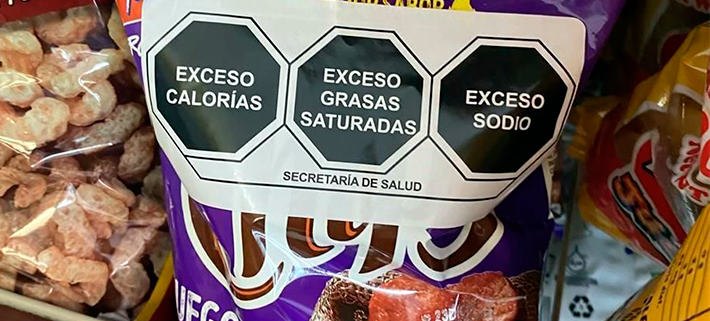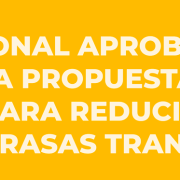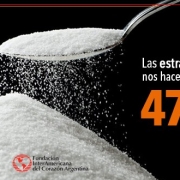On October 29, 2020, the Chamber of Senators gave a half sanction to the bill for the Promotion of Healthy Eating, with 64 positive votes and 3 negative. From then on, the Chamber of Deputies had the duty to promote the corresponding legislative treatment until it was approved. However, the procedure to date has undergone a series of back and forth that jeopardizes its approval.
“Below, we offer a google translate version of the original article in Spanish. This translation may not be accurate but serves as a general presentation of the article. For more accurate information, please switch to the Spanish version of the website. In addition, feel free to directly contact in English the person mentioned at the bottom of this article with regards to this topic”
After intense complaints from civil society organizations for the lack of initiative from the Chamber of Deputies, an information meeting was held within the framework of the special sessions on February 23 of this year. There, referents from the industry sector, as well as representatives of consumer and health organizations, shared information and presented their position on the various regulations and measures that make up the regulations in question. However, the deadlines were not sufficient for deputies to manage to implement it. The parliamentary debate on the bill should have been postponed.
At the same time, almost surprisingly, the National Executive Power broke into the ambit of the National Food Commission (CONAL) and Mercosur with the presentation of another proposal regarding the frontal nutritional labeling of foods. This proposal has the particularity of being friendlier and more flexible with the food industry inasmuch as it not only modifies the nutrient profile system (that is, the values from which it is possible to consider an edible high in sugars, sodium, fat or calories), but also excludes the entire set of other measures that are also part of the current bill. These include regulations for school environments and issues related to advertising.
Faced with this scenario, the demands of civil society were once again necessary for the Chamber of Deputies to resume and promote the treatment of the bill for the Promotion of Healthy Eating. Thus, on April 6 and already within the framework of its ordinary sessions, the fourth information session took place. On this occasion, Fundeps, together with other organizations, highlighted the strengths that the current bill presents in the field of health protection, the need to maintain its parliamentary treatment and the urgency in which the bill is approved without modifications.
Why is it important that it be through the National Congress and not through CONAL?
The proposal promoted by the National Executive Power in CONAL and Mercosur implies a relaxation of the protection standards in health matters. In this sense, it presents important differences with the bill.
One of them is the one concerning the graphic system. The bill establishes that non-alcoholic packaged foods and beverages must include a warning stamp with the legend “excess in” on the main face of the packaging. However, the resolution presented by the Executive proposes its modification to “stop in”. This is not minor or coincidental, if one takes into account that the available scientific evidence indicates that the expression “high in” does not generate the alert that is expected in consumers, and consequently the effectiveness of the policy may be diminished. If an edible design contains excessive amounts of critical ingredients, this circumstance should be expressed as clearly and simply as possible.
A second difference is given by the nutrient profile adopted. This would no longer be that of the Pan American Health Organization (PAHO), but another much more lax one that would make products reached by warning seals according to the PAHO nutrient profile, be offered in the market as free of black octagons . The best scientific evidence available to date and, above all, free of conflicts of interest, shows that the OPS profile allows identifying the products that, beyond the size of the portion considered, tend to unbalance the diets of the people and, consequently, negatively impact their health.
A third difference is that the Executive’s presentation, by limiting itself only to food labeling, leaves key points of the bill unregulated, such as school environments, issues concerning advertising, claims regulations, and seals of endorsement, etc. The bill that is under treatment in the Chamber of Deputies is characterized by being a comprehensive regulation that seeks to penetrate much deeper, as it would allow us to improve our environments, making them healthier and safer spaces. This takes on greater relevance if one seeks to protect the well-being and health of children and adolescents, who, since they are in a stage of training and development, require special protection from the State.
Finally, it remains to add that if the Executive’s proposal continues its course until it is approved by CONAL or Mercosur, the voice of the society represented in the National Congress would be disregarded. This body, established as the highest bastion of popular will, has a constitutional duty to legislate and promote measures that guarantee the full enjoyment and exercise of the rights recognized by the Constitution and international human rights treaties. Likewise, it should be noted that the legislative body is the one that allows more participatory work and greater control by citizens. Unlike what happens in CONAL, whose mode of operation is more hermetic, and where citizens have greater difficulties in accessing what is deliberated and resolved there.
It must be said that the current bill is not only based on the best available scientific evidence free of conflicts of interest, but has also been the result of long processes of discussion and consensus between different political parties. These circumstances allow this type of policy to be conceived as a State policy, giving it more strength, greater legitimacy and more possibilities that it can be sustained over time.
It took many years to accomplish this very important step. Today, the conditions are in place for Argentina to have the best law. The high prevalence of chronic non-communicable diseases, which currently affects the population, requires a policy that more comprehensively addresses public health problems.
In this sense, the draft Law for the Promotion of Healthy Eating is a necessary measure to protect the constitutional rights to health, adequate food and the rights of consumers. That is why, we ask our deputies to unite their wills so that the project passes quickly to an opinion and that it finally becomes a law without modifications.
Author
Maga Merlo Vijarra
Contact
Agustina Mozzoni, agustinamozzoni@fundeps.org










